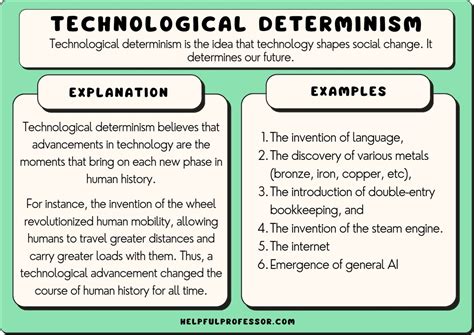Understanding the intricacies of technology can seem daunting, but grasping the fundamental theories behind it can make all the difference. In this article, we will delve into five essential tech theories that have revolutionized the way we interact with technology. From the basics of algorithms to the complexities of blockchain, we will break down each theory in a way that's easy to understand.
What is a Tech Theory?
Before we dive into the five essential tech theories, let's define what a tech theory is. A tech theory is a concept or principle that explains how technology works or how it can be applied to solve real-world problems. Tech theories provide a framework for understanding the underlying mechanics of technology and help us develop new solutions to complex challenges.

1. Algorithm Theory
Algorithm theory is the study of algorithms, which are sets of instructions that a computer follows to solve a problem or complete a task. An algorithm is like a recipe for a computer; it provides a step-by-step guide for solving a problem. Algorithm theory explores the efficiency, complexity, and optimization of algorithms.
There are several types of algorithms, including:
- Sorting algorithms, which arrange data in a specific order
- Searching algorithms, which find specific data within a dataset
- Graph algorithms, which analyze and manipulate complex networks
Algorithm theory has numerous applications in computer science, including:
- Data analysis and machine learning
- Computer networks and cybersecurity
- Artificial intelligence and robotics

2. Blockchain Theory
Blockchain theory is the study of blockchain technology, which is a decentralized, distributed ledger that records transactions across a network of computers. Blockchain theory explores the security, scalability, and transparency of blockchain systems.
A blockchain consists of a series of blocks, each containing a set of transactions. Each block is linked to the previous block through a unique code called a "hash," creating a permanent and unalterable record.
Blockchain theory has numerous applications, including:
- Cryptocurrencies, such as Bitcoin and Ethereum
- Supply chain management and logistics
- Identity verification and security

How Blockchain Works
Here's a step-by-step explanation of how blockchain works:
- A network of computers is established, each with a copy of the blockchain.
- When a new transaction is made, it is broadcast to the network.
- The transaction is verified by special nodes on the network called "miners."
- Once verified, the transaction is combined with other transactions in a block.
- Each block is given a unique code, or "hash," that links it to the previous block.
- The block is added to the blockchain, which is updated on each node in the network.
3. Cloud Computing Theory
Cloud computing theory is the study of cloud computing, which is a model of delivering computing services over the internet. Cloud computing theory explores the scalability, flexibility, and cost-effectiveness of cloud computing systems.
Cloud computing involves storing and processing data on remote servers, which can be accessed through the internet. This allows users to access applications and data from anywhere, on any device.
Cloud computing theory has numerous applications, including:
- Data storage and backup
- Software as a Service (SaaS)
- Infrastructure as a Service (IaaS)

4. Cybersecurity Theory
Cybersecurity theory is the study of cybersecurity, which is the practice of protecting computer systems and networks from cyber threats. Cybersecurity theory explores the security, confidentiality, and integrity of computer systems and networks.
Cybersecurity involves a range of techniques, including:
- Encryption, which scrambles data to prevent unauthorized access
- Firewalls, which block unauthorized access to a network
- Intrusion detection systems, which detect and respond to cyber threats
Cybersecurity theory has numerous applications, including:
- Network security and threat analysis
- Incident response and disaster recovery
- Identity and access management

5. Artificial Intelligence Theory
Artificial intelligence theory is the study of artificial intelligence, which is the development of computer systems that can perform tasks that typically require human intelligence. Artificial intelligence theory explores the intelligence, learning, and adaptation of artificial intelligence systems.
Artificial intelligence involves a range of techniques, including:
- Machine learning, which enables systems to learn from data
- Natural language processing, which enables systems to understand human language
- Computer vision, which enables systems to interpret visual data
Artificial intelligence theory has numerous applications, including:
- Virtual assistants, such as Siri and Alexa
- Image and speech recognition
- Predictive analytics and decision-making

Gallery of Tech Theories






What is the importance of tech theories?
+Tech theories provide a framework for understanding the underlying mechanics of technology and help us develop new solutions to complex challenges.
How do tech theories impact our daily lives?
+Tech theories have numerous applications in computer science, including data analysis, machine learning, computer networks, cybersecurity, and artificial intelligence.
What are some common tech theories?
+Some common tech theories include algorithm theory, blockchain theory, cloud computing theory, cybersecurity theory, and artificial intelligence theory.
We hope this article has provided a comprehensive overview of the five essential tech theories that have revolutionized the way we interact with technology. From algorithm theory to artificial intelligence theory, each of these theories has numerous applications in computer science and beyond. Whether you're a tech enthusiast or just starting to learn about technology, understanding these theories can help you develop a deeper appreciation for the complex systems that power our modern world.
